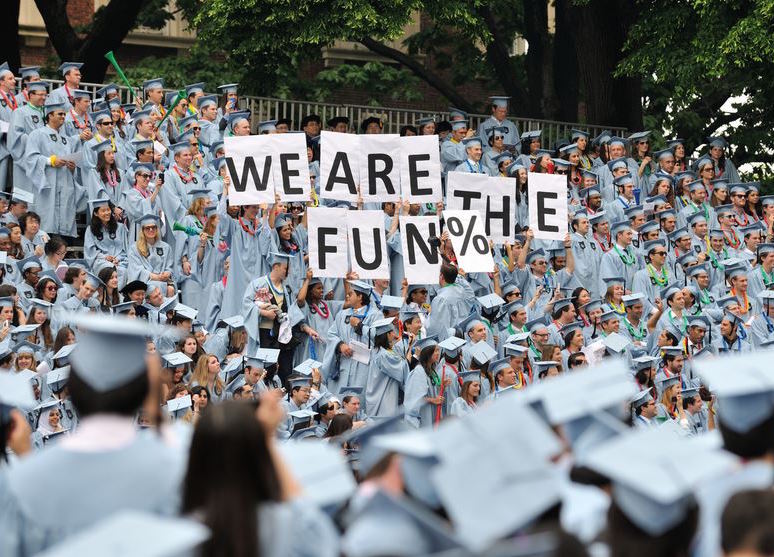The Uber Welfare State
At Columbia University, hungry students are encouraged to rely on the charity of their wealthy peers.

Students at Columbia University's 2012 commencement. Llee_wu / Flickr
Columbia University is very rich. Its endowment is worth over $9 billion and its total assets are over $16 billion. Its annual revenues are nearly $4 billion. The land alone on its thirty-two-acre main campus is probably worth close to a billion at current rates for Manhattan land — and that doesn’t include buildings on the land, the uptown medical campus, or other holdings throughout one of the world’s most expensive real-estate markets. And yet it has some students who are going hungry because they’re too poor.
But the enterprising leaders of the student government have an idea: an Uber-like app that will allow rich students to share meals with their poorer colleagues. In a mass campus-wide email sent out last week, Ben Makansi and Viv Ramakrishnan, respectively student body president and VP of policy (!), announced a “two-pronged initiative.” After an arresting opening line, “Yes, we actually did some shit,” the duo, who ran a “satirical campaign,” disclosed the twin prongs of their “pilot plan.”
The first is “Swipes, a mobile app,” that is “like Uber for meal-sharing.” It will match donations of spare swipes on their meal cards by flush students to those in need of swipes. And the second is an “Emergency Meal Fund, a peer-funded meal bank,” which is presumably like an Indiegogo for the hungry, though they don’t invoke the obvious metaphor. The hungry will be able to claim up to six meals a semester, donated by their richer peers, with “no questions asked.” Six meals a semester isn’t very many for people who are seriously short of cash.
Makansi and Ramakrishnan concede that their scheme, despite its dual prongs, is not the “be-all end-all solution to food insecurity on campus,” though they hope it will “make a substantive dent in the issue.” What’s striking is that no one is embarrassed by the patronizing grotesqueness of the arrangement.
This phenomenally well-endowed institution — not Harvard-rich, but richer than all but ten other universities in the country — can’t find it in its $9.2 billion heart to make sure its students don’t go hungry. (The 2014 return on its endowment, $1.4 billion, was only a bit smaller than Georgetown’s entire endowment.) Instead, it resorts to the sort of social entrepreneurship that is celebrated in its business school. That’s doing some shit indeed.